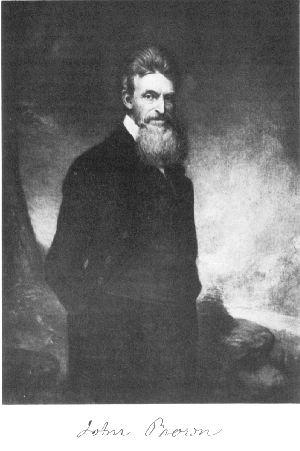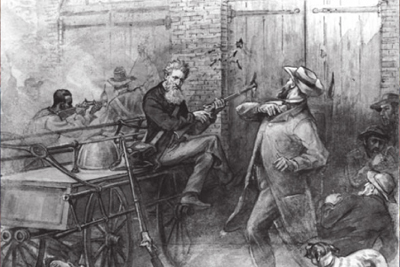Revolution #180, October 25, 2009
On the 150th Anniversary of the Anti-Slavery Attack on Harper's Ferry, Virginia
The Heroic Legacy of John Brown
 October 16 marks the 150th anniversary of John Brown's daring and heroic raid on the U.S. arsenal at Harper's Ferry, Virginia. Brown led a force of 21 men. They aimed to seize arms and distribute them to the slaves, and then go to the mountains to wage guerrilla war against slavery in the southern U.S. Brown's force quickly seized the arsenal but were unable to break out. However, they then defended the arsenal for over two days against a force of 800 militia and were only finally defeated and captured by a detachment of U.S. Marines.
October 16 marks the 150th anniversary of John Brown's daring and heroic raid on the U.S. arsenal at Harper's Ferry, Virginia. Brown led a force of 21 men. They aimed to seize arms and distribute them to the slaves, and then go to the mountains to wage guerrilla war against slavery in the southern U.S. Brown's force quickly seized the arsenal but were unable to break out. However, they then defended the arsenal for over two days against a force of 800 militia and were only finally defeated and captured by a detachment of U.S. Marines.
The Harper's Ferry raid did not come out of nowhere. By the time of the raid, U.S. society had long been simmering. The capitalists—based in the northern U.S.—were increasingly coming into conflict with the southern slave-holders on a range of economic and political issues, and the slave-holding class felt that their system was under attack. Serious political crises would periodically erupt, followed by compromise, followed by still more crises. Slave revolts and the systematic widespread escape of slaves through the "underground railroad" went on, as did severe repression against the slaves and the abolitionists (those who favored the abolition of slavery). There was widespread anti-slavery agitation by people like Frederick Douglass, the famous escaped slave. By 1859, the situation had become extremely intense—but there was still no major political figure of any established party, including Abraham Lincoln, who called for abolition of slavery in the South. It was in this situation that Brown put his plan in motion.
 John Brown was driven by a bitter hatred of slavery. But he was also inspired by a firm belief in the humanity and absolute equality of the enslaved Black masses, and in their capacity to free themselves, once they saw an opening and a way to do so. In both of these convictions—and in his unquenchable desire to end slavery as soon as possible—John Brown was far in advance of the vast majority of white abolitionists of his time. Brown fought slavery for many years, only to see the laws become ever more restrictive and the conditions of the slaves grow ever worse. He came to believe—correctly, as it turned out—that slavery would only be destroyed through armed struggle.
John Brown was driven by a bitter hatred of slavery. But he was also inspired by a firm belief in the humanity and absolute equality of the enslaved Black masses, and in their capacity to free themselves, once they saw an opening and a way to do so. In both of these convictions—and in his unquenchable desire to end slavery as soon as possible—John Brown was far in advance of the vast majority of white abolitionists of his time. Brown fought slavery for many years, only to see the laws become ever more restrictive and the conditions of the slaves grow ever worse. He came to believe—correctly, as it turned out—that slavery would only be destroyed through armed struggle.
John Brown's raid was initially condemned in both the North and South, and he was very quickly tried and sentenced to death. But Brown used his trial to put forward his anti-slavery views in a compelling way, and that, along with courage, made a strong impression. By the time of his execution, not even seven weeks after the raid, things had begun to change. In the North, the previously wavering and mostly conciliatory abolitionist movement, as well as broader masses of white people who for one reason or another opposed slavery, finally began to galvanize. This was especially so after Henry David Thoreau, a major poet and intellectual of the time, dared to step out in the midst of the anti-John Brown hysteria and declare that Brown's raid had been a blow for justice.
In the South, the slaveholders went into a frenzy of lynching and murder. But despite the severe repression, slave revolts spread through the South, particularly in the months after the government executed Brown and his comrades. In one revolt in Texas, in July 1860, slaves were alleged to have set a series of fires in a number of Texas towns; 10 whites and at least 65 Blacks were killed in the revolt and its aftermath, when white Texans went on a rampage of torture and lynching to "extract confessions." Many of the accused slaves refused to confess or implicate others and went to their deaths silent in the face of hideous tortures.
Just 18 months after Brown's raid, the first shots of the Civil War were fired. As the Union soldiers marched off to war, they sang that "John Brown's body lies a-moldering in his grave, but his soul is marching on." But even with the Civil War underway, the northern capitalists, as represented by Lincoln, still refused to free the slaves! It wasn't until 1863 that Lincoln signed the Emancipation Proclamation which finally, after 250 years of horror, freed the slaves. A few months later, Lincoln—again under pressure "from below," and forced by the need to more decisively confront and attack the South—allowed Black people to join the Union Army. The former slaves, as well as those who had won their freedom before the war, enlisted in massive numbers and played a major role in defeating the slave-holding class.
Anyone truly opposed to injustice should celebrate John Brown's life and courageous example.
(For more on the importance of slavery in the formation of the U.S. and the great struggle to abolish it, as well as the centuries-long battle against the oppression of Black people, see “The Oppression of Black People, The Crimes of This System, and The Revolution We Need,” a special issue of Revolution. We hope to print a longer historical essay on John Brown in the coming weeks.)
If you like this article, subscribe, donate to and sustain Revolution newspaper.



